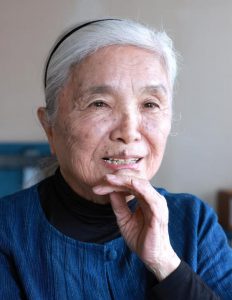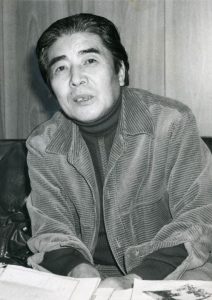My guidepost, Hiroshima pioneers: Yumi Aihara, 85, poet, speaks about poet Munetoshi Fukagawa
Dec. 4, 2023
His movements and words moved society
by Hiromi Morita, Staff Writer
Nearly 60 years have passed since Yumi Aihara moved to Hiroshima for her husband’s job. Observing the A-bombed city as a poet, she has devoted her energies in the support of A-bomb survivors living in South Korea and in honor of A-bomb literature.
“Sitting in the front row holding photos of forced laborers who passed away without waiting for the trial verdict” reads one of her poems from the poetry collection titled Tsurumibashi (in English, ‘Tsurumi Bridge’). The poem describes a scene she witnessed in the summer of 2005 while sitting in public seating during a lawsuit filed by former conscripted laborers who were forced to work at Hiroshima Mitsubishi Heavy Industries in a case heard before the Hiroshima High Court.
The individual holding the photos of the deceased was her mentor, Munetoshi Fukagawa (birth name: Masatoshi Maehata, 1921–2008). Mr. Fukagawa was a poet who, in collaboration with the A-bomb poet Sankichi Toge, worked in the anti-war poetry movement in Hiroshima following the war in a group known as ‘Our Poems Circle.’ An A-bomb survivor, he worked tirelessly to restore dignity to the conscripted Korean laborers who were forcibly brought to Japan and victimized in the atomic bombing.
Explaining the attitude she learned from her mentor, Ms. Aihara said, “I saw him compose poems while always active in society, rather than simply sitting still. That inspired me to do the same.”
On August 6, 1945, Mr. Fukagawa, who was working as an instructor for forced Korean laborers at the Hiroshima plant of Hiroshima Mitsubishi Heavy Industries (in what is now Hiroshima’s Nishi Ward), experienced the atomic bombing together with the Korean workers. After Japan’s defeat in the war, he saw off the former laborers and their families as they were set to return home. After a time, however, he received a letter from family members indicating that they had not yet returned. He would later write, “I was worried sick about them, but I was forced to live a life of desperation after the war … like an unbearable weight that never left me, the Korean workers were always on my mind.”
Lacking any clues about the laborers whereabouts, Mr. Fukagawa initiated a follow-up investigation in 1973. He traced their footsteps until the point they left Japan and ultimately discovered they had died in a maritime accident in the Genkai Sea. Later, he would hold a memorial service for the remains of those found on the coast of the Iki islands in Nagasaki Prefecture. He would repeatedly travel to South Korea to visit the bereaved family members, working to uncover facts about their lives.
It was 1981 that Ms. Aihara first met Mr. Fukagawa, who was already involved in such activities. He was teaching a class about the composition of tanka, Japanese short poems, that an acquaintance had invited her to attend.
Her skills at using a typewriter and word processor, rare in those days, impressed Mr. Fukagawa, who had her help with the work of creating a newsletter for the class and who later made her his apprentice. In 1984, Ms. Aihara became a participating member in Seishi, a magazine devoted to tanka that was published by Mr. Fukagawa.
At the same time, she began to accompany Mr. Fukagawa in his individual battle to seek the provision of relief to former forced laborers. Becoming an active member in that movement, Ms. Aihara engaged in administrative and fund-raising work.
“Mr. Fukagawa was someone who took the initiative in the postwar compensation trials and relief measures for overseas A-bomb survivors,” explained Ms. Aihara. Mr. Fukagawa also strove to uncover such issues as unpaid wages. In the court case in which former forced laborers claimed damages against the Japanese government and other parties, the data that Mr. Fukagawa had collected in his painstaking investigations since the 1970s played a key role.
Reflecting on those times, Ms. Aihara said, “When confronting issues he deemed unfair or unreasonable, Mr. Fukagawa had the ability to get to the heart of the matter with a sharpness belying his usually calm personality. It was surprising to me to see what drove him to that degree.” That was probably a question Mr. Fukagawa asked himself, with his background as someone who had experienced the atomic bombing with the former forced workers and as someone who belonged on the side that inflicted damage under Japan’s colonial rule. His thoughts and feelings are described in his poetry — “As autumn turns to winter, I live with doubts as a perpetrator that had inflicted damage and as an A-bomb survivor”; and “After witnessing perpetrators and victims in war, I wonder which side is to blame for the crimes of war?”
In 1990, a time when Mr. Fukagawa was fully engaged in his activities, he collapsed from a stroke in Osaka, where he was to deliver a lecture. The stroke led to a loss of speech and paralysis on the right side of his body. Ms. Aihara and Mr. Fukagawa’s wife took turns accompanying him in his rehabilitation at an Osaka hospital. Ms. Aihara also provided support to him thereafter, pushing his wheelchair at trials for former forced laborers, and elsewhere.
Since the death of her mentor, Ms. Aihara has continued to confront issues related to Hiroshima’s atomic bombing while simultaneously serving in key posts at poets’ associations and other organizations. “Each time I encounter a problem, I consider what Mr. Fukagawa would do,” explained Ms. Aihara in front of a large volume of Mr. Fukagawa’s materials, reflecting on their significance.
Yumi Aihara
Born in 1938 in Mukden (present-day Shenyang) in former Manchuria (in what is now the northeast part of China), Ms. Aihara was repatriated to Japan after that country’s defeat in the war and raised in Fukuoka City. She moved to Hiroshima in 1964. She studied under Mr. Fukagawa and became a participating member in Seishi, a magazine devoted to tanka poetry, in 1984. She served as executive director of the Hiroshima Committee to Invite Korean A-bomb Survivors to Japan for Medical Treatment, a group active during the period 1984–2016. She also served as Chugoku regional secretary of the Japan Tanka Poets’ Society and as chair of the Hiroshima Prefectural Poets Association. She is a resident of the city’s Naka Ward.
Keywords
Lawsuit filed by former conscripted laborers at Mitsubishi Heavy Industries
A lawsuit filed by former conscripted laborers for damages against the Japanese government, Mitsubishi Heavy Industries, and other entities. The laborers had been forcibly brought to Japan from the Korean Peninsula, which was then under Japanese rule, under the National Requisition Ordinance, and experienced the atomic bombing while working at the Hiroshima plant of Hiroshima Mitsubishi Heavy Industries and other worksites. In 2007, Japan’s Supreme Court acknowledged the government’s responsibility for neglect of overseas A-bomb survivors over many years and ordered it to pay compensation for damages. The decision greatly influenced the government’s subsequent relief measures for overseas A-bomb survivors.
(Originally published on December 4, 2023)









